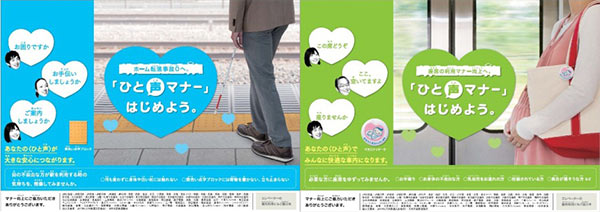Every language has unique features of structure, grammar etc. which are shaped by the people who speak the language, and which play a role in shaping those people as well. One type of grammar students of Japanese encounter early on is verbs ending in 〜ましょう ~masho, which means “let’s do [whatever].” Some examples include 食べましょう tabemasho “let’s eat,” or 電車で行きましょう densha de ikimasho “let’s go by train,” or ジェイリストで焼くキットカットを買いましょう jei-risuto de yaku kitto katto o kaimasho “let’s buy bakable Kit Kat at J-List” (heh). One unique feature of this verb form is that it can place an invisible obligation on listeners to go along with the request, which is why the Japanese government runs ads using language like “let’s declare our income and pay our taxes accurately” during tax season. Currently Tokyo is having a campaign to get passengers on trains to “manner up” (er, improve their manners in public). The new signs remind people to be polite and courteous, with slogans like “let’s give up our seat to elderly or blind passengers as well as pregnant women.” Cooperative slogans like these are definitely more effective with harmony-loving Japanese than commanding them to do something would be, or listing what penalties might exist if they refuse to cooperate.

Let’s all “Manner Up” in trains.














